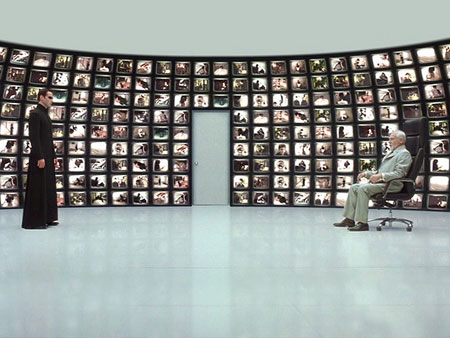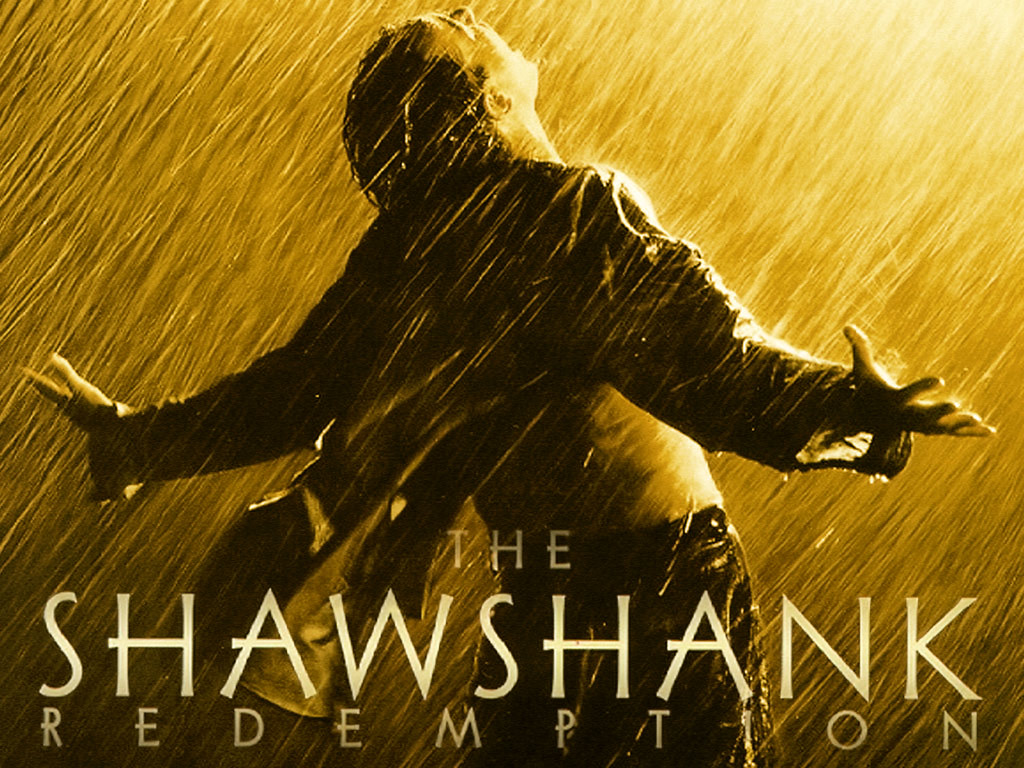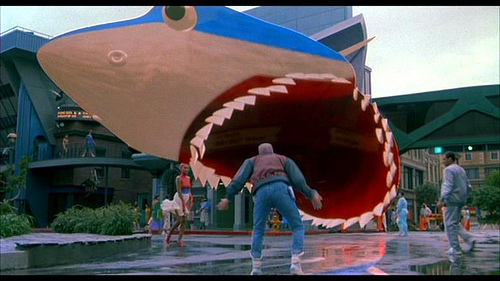The laws of drama in the IMO: when will they earn?
Dramaturgy is the most powerful tool that allows scriptwriters to keep the viewer in suspense throughout history, to make him experience a variety of emotions, and at culminating moments - to widen eyes in amazement and head off into action. Online game writers also strive for this, so it is absolutely necessary for us to apply the general laws of drama to MMOs. However, it is not worth doing this “in the forehead”: after all, MMO has its own problematic, which forces us to approach these laws selectively, sifting out improper ones, choosing the best ones and transforming them.

')
According to numerous studies, the amount of available and imposed information has increased incredibly lately. The trouble of many games is that they offer a small picture on which nothing can be disassembled, or a wall of text, in which there are a lot of extra brackets, commas. A lot of information that a player does not need to understand the main idea and become interested in it.

Most players do not read the text. Many of them do not know what laws are in effect in the game, what happens there, what the characters of this world live with. It is ridiculous and paradoxical - but there is a feeling that the players do not need a story in and of itself: they just need to know what it is. Active players will read everything and write about everything on the forum, making it in a concise form. And the rest of the players, after reading that there is a story on the forum, calm down. This is very sad - after all, so that the story turned out to be really exciting and the players like it, a lot of work has been done - one cannot say that it’s in vain, but its result is clearly not in demand.

So you can not live! It is necessary to break this wall between the player and the script, and we have all the tools for this. For thousands of years, people have been telling stories - from Aristotle to the Hollywood luminaries of our day. Everything has already been invented, we can only use this luggage.
Portrait of a hero (of our time)
So, let's see what stands between us and the player. The first problem is that we do not know the protagonist of our story . It is often said that the main character is the story. I can say that the writers who work with the ready-made hero are just lucky and freeloaders, because half the work is done for them. Unfortunately, we do not have such a powerful resource, so we have to find a solution ourselves. The solution is simple: the king makes retinue. We have to create bright, interesting, memorable, charismatic characters who will bear the whole burden of the plot and form the image of the main character - the image of the player.
At a pace, guys, at a pace!
The next problem of the game writer is tempo rhythm . If you open any Hollywood textbook on film dramaturgy, you will see that everything is written there, like on notes. The accentuating event must occur no later than the 10th minute, or on the 10th page of the script, on the 35th - 40th page the first act should end, and so on. This is the experience of a gigantic industry.
Unfortunately, when we deal with a game, we are unable to predict such things. Imagine a player who first plunged into our game. He starts a great adventure. We inject an atmosphere for him. He is ready to make the greatest feat in life ... And then his mother calls him to do homework. All the efforts that we have made to make a player a hero have disappeared: after the lessons he will come, which is called “with a cold nose” and will not be able to immerse in the proposed circumstances at the degree we have planned. And even then it will forget everything we told him.
How to solve this problem? It is necessary to forget about the walls of the text and learn how to tell short stories, to do it in a fragmentary way, to split up information into the smallest meaningful parts.
In addition, you should not extrude a player with events that occur every three seconds. Give him the opportunity to catch his breath, to understand what is happening, and only then, joyful and contented, will move on. No need for long, lengthy explanations. If in order to state the essence of what is happening, you need more than two paragraphs, this is the wrong essence or you have a wrong explanation.

And who am I? What am I doing here? How to get out of here?
The next problem is that the player not only knows nothing, but he is not ready to find out . At first I came to understand that people do not read the texts, and then I noticed this with me. If the game does not take me by the throat, they do not force me to do it, sometimes I do not read the text myself. Probably, the flow of information is so great that in the brain some fuses are triggered, which signal “Calm down! You don't need this! Do not overload! RAM is not enough! Everything!". We need to be able to overcome these barriers.
To do this, we successfully use such a powerful dramatic reception as recognition. For example, in Allods, the Online Player sees both birches, and golden domes of churches, and industrial landscapes. They work as “anchors” that bind his real world and that world invented by us into which he falls. These anchors are very important, especially at first.
In the case of foreign audiences, things are a little different. Allods were made, first of all, for the Russian market, and we deliberately went that the huts and girls in kokoshniks outside of it (I’m exaggerating now, the girls in kokoshniks are not there :) will be a kind of exotic. Judging by the feedback we receive, it worked: for our foreign players, political instructors in epaulets and other Soviet characters look new and unusual, and this is what makes them tick.

The next trick is dramatic irony: the player or the viewer knows some information (or some things are familiar) unknown to the characters. Or these most familiar things suddenly "served" in an unexpected sauce. A great example is footage from “Back to the Future – 2” when an ad for the movie “Jaws-19” flies to McFly. Such moves cause positive associations that tie the viewer (or, in our case, the player) to the product.

Another incredibly important thing is maintaining interest . Watching the fourth part of “Indiana Jones”, the viewer thinks about what will happen to Indiana at the atomic test site when he gets into the refrigerator. Will he survive or not? And even if everyone understands that, according to the law of the genre, nothing terrible will happen to him! We are still interested to know how the creator of the film will get out of this situation. These are the moments that arouse interest, curiosity, form the affection of the viewer to what he is looking at, and, accordingly, the player to what he is playing.
Some may argue that in films or in books there is a beginning and a final, and in fact games, in theory, should not end. Let's think about Bond, for example. There is no end to this story - James Bond is immortal; moreover, he is still moving from one body to another - he used to be a brunette, and now he has become blond. It seems to me that the plot of the IMO is about the same fate: at first we tell one specific Episode. After some time, he inevitably “burns out”, including thanks to negligent users who reveal plot intrigue (for example, they write on the game forum that the killer is a butler). Nothing can be done about it - but, on the other hand, there is always the opportunity to create new episodes.
This technique is actively used by the series. There is even a division into vertical and horizontal - in the vertical serials, each episode is a complete story. At the same time, from the point of view of dramatic art, the serial industry has already made a very, very far (I mean, first of all, American products), and sometimes it is more interesting to watch TV shows than a great movie.

How to teach and how to tell?
And a few more thoughts on how to immerse the player in a new world. It helps all the same fragmentation of information - it does not need to throw out huge cloths of text (or even video, because the video can also be tired!), And crush into small pieces and scatter around the game world. In this case, do not hesitate to repeat what has already been said 2–3 times - it is likely that the player will miss what you were trying to convey the first two times.
A very serious question - the training of the player and the work of administrators. It is believed that when the administrator begins to communicate with users, it greatly simplifies the game world and the plot of the game. I do not agree with this - it seems to me that such work is needed, but it is important that the person is qualified and knowing what he is talking about.
It’s no secret that one of the IMO scriptwriter's constant headaches is to come up with a reason why a player needs to kill a certain number of monsters once again . At first glance it may seem a trifle, but this moment is very important. No need to force the player to spray on the little things. Before the player it is necessary to set global tasks, which consist of many small bricks. Only then will he have a sense of belonging to something big and great, and not to solving local problems.

And finally, the biggest problem that affects not only the writers, but also all those who work in game devs is the struggle for attention . In parallel, the player thousands of other talented storytellers want to tell their story to us, new games, books, and films are constantly coming out. We have only one opportunity to make a player as an ally, and in no case should we miss it - information competition is too great. And this is the case when I do not have one hundred percent recipe. I have only one piece of advice: you need to surprise and not be afraid of anything. No taboos! Make it so that your game gives people the opportunity to learn something new or look at the old from an unexpected angle.
And why is it all?
With proper use of the laws of drama, the game world will become a platform for the development of countless stories, and each of them will capture players with a new power. Then and only then will the players be faithful to you, think of you, and wait for new meetings with your heroes.
If you want to learn more about the practical aspects of the application of a law or how this or that complexity was solved by the writers of Allods - ask, I will answer in the comments.

')
You only have a few seconds to grab and hold the attention of a person. The postulates of Hollywood scenario gurus that “the starting event should take place no later than 10 minutes of the film” have not been respected for a long time.
According to numerous studies, the amount of available and imposed information has increased incredibly lately. The trouble of many games is that they offer a small picture on which nothing can be disassembled, or a wall of text, in which there are a lot of extra brackets, commas. A lot of information that a player does not need to understand the main idea and become interested in it.

The greatest minds have already formulated laws that work in the theater, in literature, and in the cinema. It remains only to transform them for games
Most players do not read the text. Many of them do not know what laws are in effect in the game, what happens there, what the characters of this world live with. It is ridiculous and paradoxical - but there is a feeling that the players do not need a story in and of itself: they just need to know what it is. Active players will read everything and write about everything on the forum, making it in a concise form. And the rest of the players, after reading that there is a story on the forum, calm down. This is very sad - after all, so that the story turned out to be really exciting and the players like it, a lot of work has been done - one cannot say that it’s in vain, but its result is clearly not in demand.

A significant number of players do not know, and 10% of the information about the world of their game - they just need to know that it is
So you can not live! It is necessary to break this wall between the player and the script, and we have all the tools for this. For thousands of years, people have been telling stories - from Aristotle to the Hollywood luminaries of our day. Everything has already been invented, we can only use this luggage.
Portrait of a hero (of our time)
So, let's see what stands between us and the player. The first problem is that we do not know the protagonist of our story . It is often said that the main character is the story. I can say that the writers who work with the ready-made hero are just lucky and freeloaders, because half the work is done for them. Unfortunately, we do not have such a powerful resource, so we have to find a solution ourselves. The solution is simple: the king makes retinue. We have to create bright, interesting, memorable, charismatic characters who will bear the whole burden of the plot and form the image of the main character - the image of the player.
At a pace, guys, at a pace!
The next problem of the game writer is tempo rhythm . If you open any Hollywood textbook on film dramaturgy, you will see that everything is written there, like on notes. The accentuating event must occur no later than the 10th minute, or on the 10th page of the script, on the 35th - 40th page the first act should end, and so on. This is the experience of a gigantic industry.
Unfortunately, when we deal with a game, we are unable to predict such things. Imagine a player who first plunged into our game. He starts a great adventure. We inject an atmosphere for him. He is ready to make the greatest feat in life ... And then his mother calls him to do homework. All the efforts that we have made to make a player a hero have disappeared: after the lessons he will come, which is called “with a cold nose” and will not be able to immerse in the proposed circumstances at the degree we have planned. And even then it will forget everything we told him.
How to solve this problem? It is necessary to forget about the walls of the text and learn how to tell short stories, to do it in a fragmentary way, to split up information into the smallest meaningful parts.
In addition, you should not extrude a player with events that occur every three seconds. Give him the opportunity to catch his breath, to understand what is happening, and only then, joyful and contented, will move on. No need for long, lengthy explanations. If in order to state the essence of what is happening, you need more than two paragraphs, this is the wrong essence or you have a wrong explanation.

Tell me who gives you quests ... Tell me who you feed ... Tell me what problems you solve ... And I will tell you who you are!
And who am I? What am I doing here? How to get out of here?
The next problem is that the player not only knows nothing, but he is not ready to find out . At first I came to understand that people do not read the texts, and then I noticed this with me. If the game does not take me by the throat, they do not force me to do it, sometimes I do not read the text myself. Probably, the flow of information is so great that in the brain some fuses are triggered, which signal “Calm down! You don't need this! Do not overload! RAM is not enough! Everything!". We need to be able to overcome these barriers.
To do this, we successfully use such a powerful dramatic reception as recognition. For example, in Allods, the Online Player sees both birches, and golden domes of churches, and industrial landscapes. They work as “anchors” that bind his real world and that world invented by us into which he falls. These anchors are very important, especially at first.
In the case of foreign audiences, things are a little different. Allods were made, first of all, for the Russian market, and we deliberately went that the huts and girls in kokoshniks outside of it (I’m exaggerating now, the girls in kokoshniks are not there :) will be a kind of exotic. Judging by the feedback we receive, it worked: for our foreign players, political instructors in epaulets and other Soviet characters look new and unusual, and this is what makes them tick.

Shock is our way. Do not be afraid to surprise the player in the most unusual ways.
The next trick is dramatic irony: the player or the viewer knows some information (or some things are familiar) unknown to the characters. Or these most familiar things suddenly "served" in an unexpected sauce. A great example is footage from “Back to the Future – 2” when an ad for the movie “Jaws-19” flies to McFly. Such moves cause positive associations that tie the viewer (or, in our case, the player) to the product.

Recipe for the game scenario: recognizability, dramatic irony, interestingness
Another incredibly important thing is maintaining interest . Watching the fourth part of “Indiana Jones”, the viewer thinks about what will happen to Indiana at the atomic test site when he gets into the refrigerator. Will he survive or not? And even if everyone understands that, according to the law of the genre, nothing terrible will happen to him! We are still interested to know how the creator of the film will get out of this situation. These are the moments that arouse interest, curiosity, form the affection of the viewer to what he is looking at, and, accordingly, the player to what he is playing.
Some may argue that in films or in books there is a beginning and a final, and in fact games, in theory, should not end. Let's think about Bond, for example. There is no end to this story - James Bond is immortal; moreover, he is still moving from one body to another - he used to be a brunette, and now he has become blond. It seems to me that the plot of the IMO is about the same fate: at first we tell one specific Episode. After some time, he inevitably “burns out”, including thanks to negligent users who reveal plot intrigue (for example, they write on the game forum that the killer is a butler). Nothing can be done about it - but, on the other hand, there is always the opportunity to create new episodes.
This technique is actively used by the series. There is even a division into vertical and horizontal - in the vertical serials, each episode is a complete story. At the same time, from the point of view of dramatic art, the serial industry has already made a very, very far (I mean, first of all, American products), and sometimes it is more interesting to watch TV shows than a great movie.

Three NO game scenarios: NO km of text, NO infinity of events, NO hours of clarification
How to teach and how to tell?
And a few more thoughts on how to immerse the player in a new world. It helps all the same fragmentation of information - it does not need to throw out huge cloths of text (or even video, because the video can also be tired!), And crush into small pieces and scatter around the game world. In this case, do not hesitate to repeat what has already been said 2–3 times - it is likely that the player will miss what you were trying to convey the first two times.
A very serious question - the training of the player and the work of administrators. It is believed that when the administrator begins to communicate with users, it greatly simplifies the game world and the plot of the game. I do not agree with this - it seems to me that such work is needed, but it is important that the person is qualified and knowing what he is talking about.
It’s no secret that one of the IMO scriptwriter's constant headaches is to come up with a reason why a player needs to kill a certain number of monsters once again . At first glance it may seem a trifle, but this moment is very important. No need to force the player to spray on the little things. Before the player it is necessary to set global tasks, which consist of many small bricks. Only then will he have a sense of belonging to something big and great, and not to solving local problems.

Remember! Thousands more game writers want to tell their story to the same player.
And finally, the biggest problem that affects not only the writers, but also all those who work in game devs is the struggle for attention . In parallel, the player thousands of other talented storytellers want to tell their story to us, new games, books, and films are constantly coming out. We have only one opportunity to make a player as an ally, and in no case should we miss it - information competition is too great. And this is the case when I do not have one hundred percent recipe. I have only one piece of advice: you need to surprise and not be afraid of anything. No taboos! Make it so that your game gives people the opportunity to learn something new or look at the old from an unexpected angle.
And why is it all?
With proper use of the laws of drama, the game world will become a platform for the development of countless stories, and each of them will capture players with a new power. Then and only then will the players be faithful to you, think of you, and wait for new meetings with your heroes.
If you want to learn more about the practical aspects of the application of a law or how this or that complexity was solved by the writers of Allods - ask, I will answer in the comments.
Source: https://habr.com/ru/post/150502/
All Articles